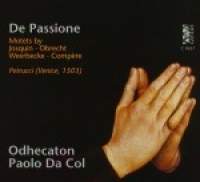Texte paru dans: / Appeared in:

Fanfare Magazine: 37:6 (07-08/2014)
Pour
s'abonner / Subscription information
Les abonnés à Fanfare Magazine ont accès aux archives du
magazine sur internet.
Subscribers to Fanfare Magazine have access to the archives of the magazine
on the net.
Cantus
C9637

Code-barres / Barcode : 8424619696379
Consultez toutes les évaluations recensées pour ce cd
~~~~ Reach all the evaluations located for this CD
This is the third disc on as many labels that we have heard from Paolo Da Col in the last couple of years. There were half a dozen others dating back to the founding of this Italian male vocal ensemble of 11 voices in 1998, and another on Cantus has not arrived yet. The most unusual of the seven selections is the anonymous piece from Sardinia (“tristu” is not a typo), one of the Marian laments for Good Friday so familiar in Italy as far back as the late Middle Ages, sung here as a solo very effectively by a guest soprano, Clara Murtas, in a folk style. The most familiar of the six motets is Josquin’s Miserere mei, one of his greatest works, climaxing the program. The first five works on the disc, not among the more familiar Renaissance motets on records, were all published in Petrucci’s Motetti B in 1503. The longest is Loyset Compere’s cycle of nine motets for the Office of the Cross. The other two Josquin works are a five-part Office of the Passion, O Domine Jesu Christe, and another motet cycle in six parts, both recorded only incompletely several times. But all three cycles were recorded (with some shorter pieces) by Ensemble Charneyron on a Kontrapunkt CD that apparently never appeared here. The remaining three pieces are briefer.
Of the
three shorter pieces, the Obrecht Motet appeared four times on obscure discs
before 1977, but this is the only version on CD that I can find since then.
The only recording of the Compère Motet currently listed is an instrumental
version on an obscure German label.
Gaspar van
Weerbeke (c. 1445–c.
1516),
active with the Sforzas and the Sistine chapel, is so obscure that his
recorded works seem to be limited to three tracks on the recent De
Orto/Josquin (37: 1) and a motet on Alpha MBM 10, so this is a premiere.
These additions to the discography and the superb execution of Josquin’s
Miserere mei confer a high recommendation on this disc. The vocal group does
not include any of the familiar names that have sung with Italian vocal
ensembles over the years. Da Col achieves superb cohesion from his singers,
and he makes the works seem more familiar than they are. The execution is
lovely. If I had to quibble, I would suggest that the solo lament is out of
place in this program. Don’t let that minor objection deter you from
discovering this marvelous collection of music for the Passion.
Fermer la fenêtre/Close window
Cliquez l'un ou l'autre
bouton pour découvrir bien d'autres critiques de CD
Click either button for many other reviews


